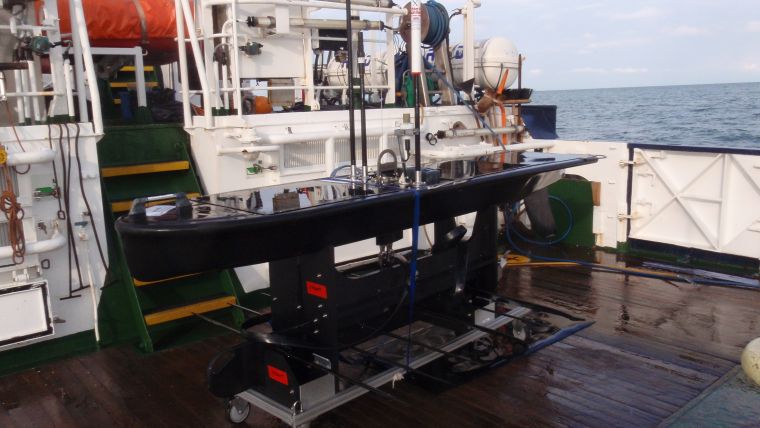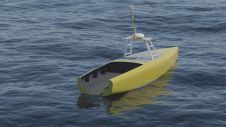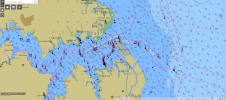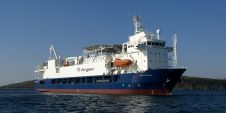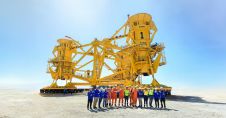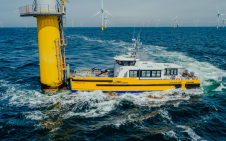115 Years of World-class Science and Collaboration
Cefas
In 2017, the Centre for Environment, Fisheries and Aquaculture Science (Cefas) is celebrating its 20th year in its current form, as an executive agency for government. Cefas is recognised internationally for a breadth and depth of science capability in the marine and aquatic environment, helping the UK government monitor and manage the country’s marine environment. However, the organisation’s history extends much further, all the way back to 1902 when the Lowestoft laboratory was known as the Marine Biological Association (MBA).
In 1902, the organisation’s remit was simply to collect and analyse data for the management of UK fisheries. Since then, Cefas have been tasked with providing marine expertise for many different users and their needs as part of the UK government’s national and international commitments to sustainably manage the marine environment through evidence-based decision making. This has required a shift in the type of work Cefas undertakes, the equipment Cefas uses and the skills of Cefas scientists and technologists to carry out world-leading research to increase our understanding of the seas, as well as collecting and analysing evidence for specific programmes.
Predicting Future Science Needs
As new pressures and users of the marine space become evident, and new technologies and techniques emerge to enable more informed management, the organisation has evolved and developed its scientific and technical capabilities. This ensures that, despite changing needs and abilities, the marine and aquatic evidence and advice provided by Cefas to governments (domestic and overseas), academic collaborations and partnerships with the private sector remains world class.
Cefas combines these new innovations with 115 years of institutional memory and datasets. By analysing over a century of data and thanks to new equipment and in consideration of new scientific thinking it has been possible to spot long-term trends in fisheries, climate, and across other indicators of marine environmental health. Cefas is using modern technology and modelling capabilities to collect further data, and project the changes which may occur in the marine environment due to different pressures and stresses. Throughout its history, Cefas has played a central role in providing a robust evidence base to policy decisions, which remains as relevant in 2017 as in 1902.
Harnessing the Potential of Open Data
In recent years, Cefas have been enabling access to much of this data. In 2015, the organisation launched the Cefas Data Hub – a portal offering free access to a significant proportion of our historical and contemporary marine science datasets. In under two years, over 5400 datasets have been made freely available for industry, academic and public users to download and analyse.
Going forward, most of Cefas’ ‘new’ datasets will be acquired using cutting-edge technology. The 74m research vessel RV <i>Cefas Endeavour<i> delivers surveys for domestic and international governments and Cefas continuously assesses future scientific needs to ensure that the vessel’s capability remains appropriate for the wide range of data she collects for the assessments these inform. In the last year alone, RV Cefas Endeavour has been upgraded through the purchase of a state of the art water sampling rosette and profiling system, and a deepwater underwater imaging capability.
However, a 21st century marine monitoring programme needs to extend beyond vessel-based technology. Indeed, Cefas is leading proponents of integrated monitoring solutions – drawing together different technologies in collaboration with a range of partners to maximise the UK’s collective evidence base, and to ensure that the UK remains a leader in marine monitoring systems and practices.
Strength in UK and International Partnerships
New technologies advance the field further, allowing Cefas to monitor more environmental indicators in more sites with greater accuracy and at a cheaper cost. Cefas scientists work closely with academic institutions and industry to share expertise on scientific needs, test technological advances (sometimes deployed on Cefas platforms) and enhance existing third party tools.
In the summer of 2016, Cefas collaborated with Liquid Robotics (USA) to install a Cefas water sampling system on a Liquid Robotics Wave Glider SV3. Together, the two organisations achieved what is believed to be a world first by remotely triggering water sample collection from an unmanned surface vehicle (USV). During the expedition, the platform was remotely piloted to areas of scientific interest, identified from satellite observations of ocean colour. These satellite observations could then be validated by onboard instrumentation, allowing Cefas scientists to sample harmful algal blooms (HABs) remotely. From San Francisco, Liquid Robotics’ operations team piloted the USV around the North Sea’s oil terminals, ships, shallow-water and other offshore obstacles, transiting over 2,700km in the process. The partnership allowed each organisation to concentrate on their strengths and together develop a new application based on existing technologies and expertise.
Global Blue Economies
Cefas’ global remit continues to develop, through work with local and regional partners across the world to share knowledge and to demonstrate the importance of developing marine economies for sustainable blue growth. Projects delivered by Cefas overseas include collaborations with other UK marine organisations (including the UKHO and the NOC), in which the three partners are delivering expertise, advice and capacity building across a range of specialisms, including seabed mapping for Caribbean governments, enabling navigation and evidence-based decisions to manage marine resources for sustainable development. Cefas is also included in the UK-Gulf Cooperation Council partnership, working with local partners to promote collaboration between the parties.
Over the last century, the organisation has evolved from its early origins and adapted significantly over the decades, but its core purpose remains constant, with a commitment to providing world-class marine and aquatic science in the UK and internationally. Cefas will continue to work to this commitment, with our partners across sectors, supporting economic, environmental and societal benefits for UK and international blue economies.
Cefas are exhibiting at Ocean Business 2017 (Stand K14). Please come along and speak to the team to learn more about the scientific services Cefas provides to national and international governments, industry and academia.
The Centre for Environment, Fisheries and Aquaculture Science developed across time to deliver different scopes of services to the government and academia under different names (MBA, BAF, MAF, MAFF, DFR). In 1997, Cefas was established as an executive agency of Defra.
More Information

Value staying current with hydrography?
Stay on the map with our expertly curated newsletters.
We provide educational insights, industry updates, and inspiring stories from the world of hydrography to help you learn, grow, and navigate your field with confidence. Don't miss out - subscribe today and ensure you're always informed, educated, and inspired by the latest in hydrographic technology and research.
Choose your newsletter(s)
